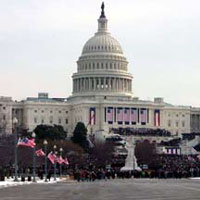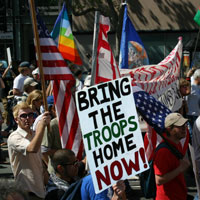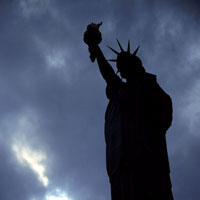- About Us
- Columns
- Letters
- Cartoons
- The Udder Limits
- Archives
- Ezy Reading Archive
- 2024 Cud Archives
- 2023 Cud Archives
- 2022 Cud Archives
- 2021 Cud Archives
- 2020 Cud Archives
- 2015-2019
- 2010-2014
- 2004-2009
 |
Ezy Reading: An Essay from the Home Front |
Arriving in the United States a little under a month ago it was easy to forget that I'd landed in a country currently at war.
Back in Australia, while we definitely have a government and troops committed to the conflicts taking place in Iraq and Afghanistan and do not take such commitments lightly, there's a definite difference in the national character compared with America that affects the profile of the situation. For one thing, we haven't suffered over 1700 casualties. That said, Australians are, in general terms, certainly not oblivious of the conflict, and in fact there's an overwhelming public opposition to the Iraq War that has encouraged many individuals to seek a better, thorough understanding of the issues involved. But further than that, while Australians are far from being either unsympathetic or unpatriotic, their displays of loyalty and commitment to the troops and to 'the cause' are in stark contrast to the 'American way'.
 I'm cautious about sounding too blasé and critical of the American national character here I, after all, have strong personal ties to the country' but I suppose you also have to be careful about being too harsh on a population that has grown up from their first day at school reciting the Pledge of Allegiance to the flag, has their former leaders memorialized in gargantuan, semi'religious monuments in Washington D.C, and has grown up in a society where terms and phrases like 'liberty', 'preserving freedom' and 'God Bless America' are used as often as 'pass the salt, please'. The fact is, when you're at the center of an empire, whether Ancient Roman or modern American, I'm sure you quite understandably buy into the ideology ' that sense of importance, significance and even invincibility that can, perhaps ultimately, prove to be your own empire's own undoing.
I'm cautious about sounding too blasé and critical of the American national character here I, after all, have strong personal ties to the country' but I suppose you also have to be careful about being too harsh on a population that has grown up from their first day at school reciting the Pledge of Allegiance to the flag, has their former leaders memorialized in gargantuan, semi'religious monuments in Washington D.C, and has grown up in a society where terms and phrases like 'liberty', 'preserving freedom' and 'God Bless America' are used as often as 'pass the salt, please'. The fact is, when you're at the center of an empire, whether Ancient Roman or modern American, I'm sure you quite understandably buy into the ideology ' that sense of importance, significance and even invincibility that can, perhaps ultimately, prove to be your own empire's own undoing.
Regardless of what may or may not contribute to the fall of empires, however, when such a nation is at war, even those who are opposed to the conflict still seem to carry with them a dialogue and strains of opposition that are tinged with that same righteousness and sense of working for the greater good that can at times make voices of challenge seem a little too close to a comfort fence of saying nothing at all. Even here in the liberal, blue streaked New England states of America, I've encountered few folks in opposition to the Iraq War who still don't discuss the issue without use of those same loaded, self important phrases of ensuring freedom for the Iraqi peoples, putting an end to evil in the Middle East and making this great nation of ours only greater.
 Part of this measured slide in dialogue away from overt negativity is a function of politics as well as of practical reality. Whenever men and women of your own nation are on the ground at war, losing lives by the day, and in the face of a challenging, dangerous enemy, it's little surprise to hear voices from across the spectrum trying to keep morale high and efforts focused on as clean and bloodless an outcome as possible. In America, where veteran's groups and the military corporation make up a powerful voting and lobby group, you'll rarely see a politician, regardless of ideological persuasion, that is readily willing to destroy his or her own career by making comments that will leave them isolated (hell, on the basis of fake evidence or not, most of these Republicans and Democrats agreed to go to war in the first place). Even among the public, whether in the peace marches of New York and Seattle over a year ago, or in the conversations taking place in coffee houses and bars across the country today, you'll find few individuals so heartless or affected by Vietnam-era Mi Lai levels of disgust and dissent that they'd declare their problems with Iraq and Afghanistan had anything to do with the soldiers' it's the politicians and decision'makers in command they have the problem with (though civilian deaths during the course of the conflict, and scandals at Abu Ghraib and Guantanamo Bay haven't helped the American troops' image, to be sure).
Part of this measured slide in dialogue away from overt negativity is a function of politics as well as of practical reality. Whenever men and women of your own nation are on the ground at war, losing lives by the day, and in the face of a challenging, dangerous enemy, it's little surprise to hear voices from across the spectrum trying to keep morale high and efforts focused on as clean and bloodless an outcome as possible. In America, where veteran's groups and the military corporation make up a powerful voting and lobby group, you'll rarely see a politician, regardless of ideological persuasion, that is readily willing to destroy his or her own career by making comments that will leave them isolated (hell, on the basis of fake evidence or not, most of these Republicans and Democrats agreed to go to war in the first place). Even among the public, whether in the peace marches of New York and Seattle over a year ago, or in the conversations taking place in coffee houses and bars across the country today, you'll find few individuals so heartless or affected by Vietnam-era Mi Lai levels of disgust and dissent that they'd declare their problems with Iraq and Afghanistan had anything to do with the soldiers' it's the politicians and decision'makers in command they have the problem with (though civilian deaths during the course of the conflict, and scandals at Abu Ghraib and Guantanamo Bay haven't helped the American troops' image, to be sure).
But at the same time, it's an especially dangerous path to try and directly silence voices of opposition, and especially within a 'democracy' that Americans claim is such a pure model for the world to follow. Post 9-11, there were numerous instances of teachers being removed from their jobs for sharing differing views of the conflict with their students. In the past few months, the ability of the media to keep their sources confidential has been under threat from the U.S justice system, and all in the name of national security. Indeed currently, one of the Republican Party's most aggressive tactics with regard to the Iraq and Afghanistan conflicts has been to declare that opposition voices to the war equate to opposition to 'our troops' and 'undermine America's safety'. Fearful of being identified as unpatriotic and critical of sweet farm boys from America's heartland currently kicking in doors in Baghdad, many Democrats have worryingly scampered for cover.
 It's important for Republicans and Democrats alike, the American media, and a free'thinking public to remember the distinction between real, important criticism of the war and the reasons for going to war and criticism of the actual men and women at ground level carrying out the orders for war. If American patriotic fervor poisons an individual's willingness to speak out against a conflict, against a specific policy or government action, or against anything for that matter, the survival of democracy in the United States is truly at stake, and the Bush administration will have taken one step closer to autocracy, something many would argue is already a risk given the current government's willingness to tie corporatism and non'secularism into their approach.
It's important for Republicans and Democrats alike, the American media, and a free'thinking public to remember the distinction between real, important criticism of the war and the reasons for going to war and criticism of the actual men and women at ground level carrying out the orders for war. If American patriotic fervor poisons an individual's willingness to speak out against a conflict, against a specific policy or government action, or against anything for that matter, the survival of democracy in the United States is truly at stake, and the Bush administration will have taken one step closer to autocracy, something many would argue is already a risk given the current government's willingness to tie corporatism and non'secularism into their approach.
Americans are in no way oblivious to the fact that their nation is at war. Nightly news reports posting photos of the deceased are a grim, inescapable reminder of that fact. Driving from Massachusetts to Maine last week I was struck by the sight in almost every local town I encountered of yet another banner or sign posted out the front of a house wishing a soldier safety and success abroad.  Over the July 4th holiday, tainted with overused phrases about 'freedom' and 'liberty', and hackneyed renditions of 'Amazing Grace' and 'America the Beautiful' as it was, the weekend's television schedule was riddled with 'tributes to the soldiers' and yet another 'Nick and Jessica Simpson sing to the troops' special. Americans may well be often charged of ignorance, but ignorant of the war they are not. Ignorant of the regrettable, but very acute deficiencies of democracy 'as preferable as it is to any other form of government' may be another matter, however.
Over the July 4th holiday, tainted with overused phrases about 'freedom' and 'liberty', and hackneyed renditions of 'Amazing Grace' and 'America the Beautiful' as it was, the weekend's television schedule was riddled with 'tributes to the soldiers' and yet another 'Nick and Jessica Simpson sing to the troops' special. Americans may well be often charged of ignorance, but ignorant of the war they are not. Ignorant of the regrettable, but very acute deficiencies of democracy 'as preferable as it is to any other form of government' may be another matter, however.
If they can only sort through some of the potentially harmful, inflated ideology and dialogue to get to a truer understanding of the nature and harsh political realities of this conflict, they may have a greater chance of preserving the original, honest ideals of American democracy than a war in faraway Iraq or Afghanistan ever could.
